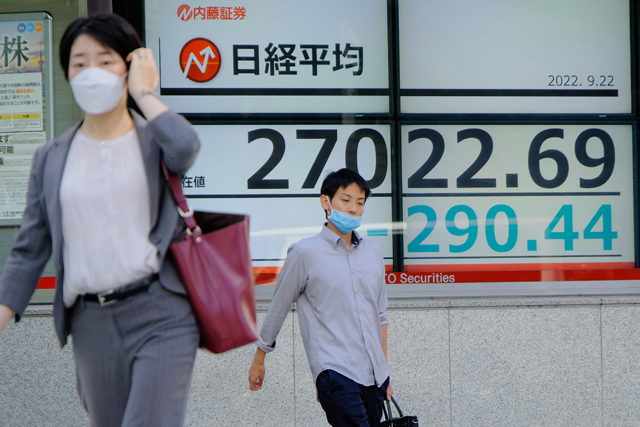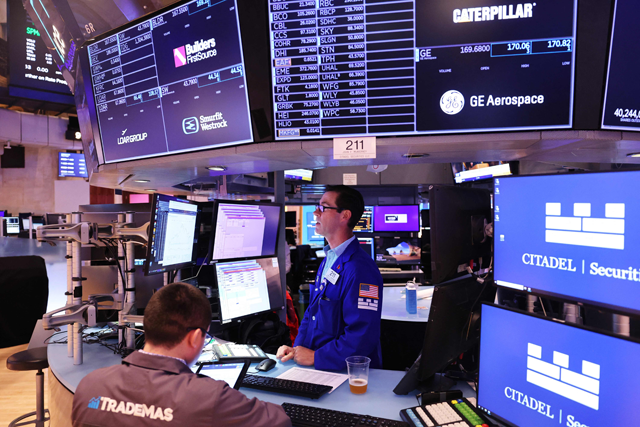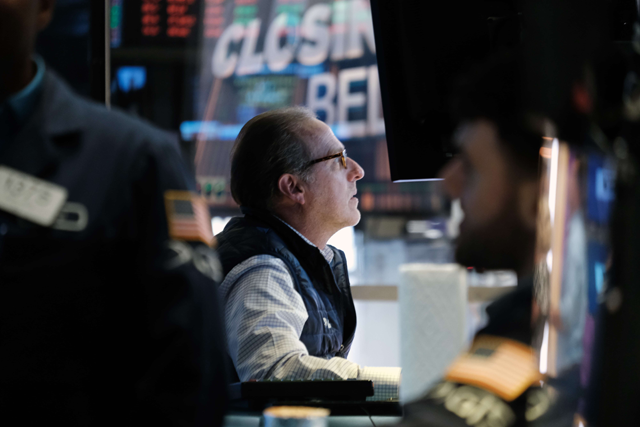You are here
Markets tumble again as Fed hikes rates, warns more to come
By AFP - Sep 22,2022 - Last updated at Sep 22,2022

Pedestrians walk past at an electronic quotation board displaying share prices of the Tokyo Stock Exchange in Tokyo, on Thursday (AFP photo)
HONG KONG — Asian and European markets sank on Thursday and the dollar rallied after the Federal Reserve (Fed) unveiled a third straight jumbo interest rate hike, said more were in the pipeline and warned the battle against inflation was straining the US economy.
While the three-quarter-point rise was widely expected, there was some surprise at the central bank's forecast that borrowing costs would likely be held above 4 per cent throughout next year.
Fed boss Jerome Powell reiterated his determination to focus on bringing down inflation — which is at a four-decade high — and accepted that the campaign would hit Americans hard.
"We have got to get inflation behind us," Powell said after a two-day meeting of the Fed policy committee. "I wish there were a painless way to do that. There isn't."
He added that "the historical record cautions strongly against prematurely loosening policy" and the Fed would "keep at it until the job is done".
All three main indexes on Wall Street tumbled Wednesday as traders contemplated an era of higher-for-longer rates, which could hit companies' bottom lines.
Asia followed suit, with Hong Kong down at an 11-year low — while Tokyo, Shanghai, Seoul, Singapore, Mumbai, Taipei and Manila also down.
London, Paris and Frankfurt extended the losses in early trade.
However, the dollar continued its strong march higher, striking a fresh 24-year high of 145.90 yen, which prompted the government to embark on a rare intervention to protect its currency.
The US Fed has for months tried to walk a fine line between fighting soaring prices and trying to keep the economy from contracting, but officials accept the chances of success are narrow.
"With the new rate projections, the Fed is engineering a hard landing — a soft landing is almost out of the question," said Seema Shah, of Principal Global Investors.
"Jerome Powell almost channelled his inner Paul Volcker... talking about the forceful and rapid steps the Fed has taken, and is likely to continue taking, as it attempts to stamp out painful inflation pressures and ward off an even worse scenario later down the line."
Volcker used aggressive measures to quell runaway prices in the 1980s, when inflation was last as high as it is now.
Commentators are now betting on a fourth straight 75-basis-point rate hike at the next Fed meeting in November.
All three main indexes on Wall Street tumbled Wednesday as traders contemplated an era of higher-for-longer rates, which could hit companies' bottom lines.
"This meeting once again demonstrates that the Fed is willing to do what is necessary to bring inflation under control. It will slow demand by keeping rates higher for longer — even if this means growth and jobs are lost," said Christian Scherrmann, of asset management firm DWS.
"The current view of the central bankers is still that this will cause a slowdown, but not a recession. We fully agree that bitter medicine to win back price stability is necessary. But we fear its side-effects will be harsher than the Fed is currently projecting."
Fidelity International's Anna Stupnytska said a long-hoped-for change of direction from the Fed "now seems further away", though added that a significant tightening of monetary financial conditions could see an earlier pause in the rate hikes.
The Swiss central bank followed up Thursday with a 0.75 percentage point hike and Norway lifted its rate to an 11-year high. Indonesia and the Philippines also tightened policy.
Investors are now preparing for a large move from the Bank of England later in the day.
Still, the Bank of Japan decided not to shift from its ultra-loose measures owing to its determination to kickstart the country's torpid economy. The decision leaves it as the only major central bank with negative rates, a policy that has sent the yen plunging 20 per cent this year.
However, the currency got a bounce after the finance ministry stepped into the currency markets, pushing the dollar back below 143 yen.
Other currencies were also under pressure, with the euro wallowing at a 20-year low and sterling touching a fresh 37-year nadir of $1.1221.
The greenback was also at multiyear highs on the South Korean won, Chinese yuan, Australian dollar and Canadian dollar, among others.
Oil prices edged up after a rollercoaster on Wednesday.
Both contracts spiked in reaction to President Vladimir Putin's announcement of a partial mobilisation of the Russian army and a veiled threat to use nuclear weapons against the West.
But they soon retreated as investors once again turned to the likely impact on demand from an expected recession across world economies.
Related Articles
PARIS — Stock markets jumped on Friday after US Federal Reserve chief Jerome Powell made clear that the central bank was ready to cut intere
PARIS — Stock markets dropped again on Monday, extending last week's rout as investors brace for another big rate hike by the US Federal Res
TOKYO — The Bank of Japan (BoJ) was widely expected to keep its ultra-low interest rates unchanged recently but analysts say the tumbling ye


















